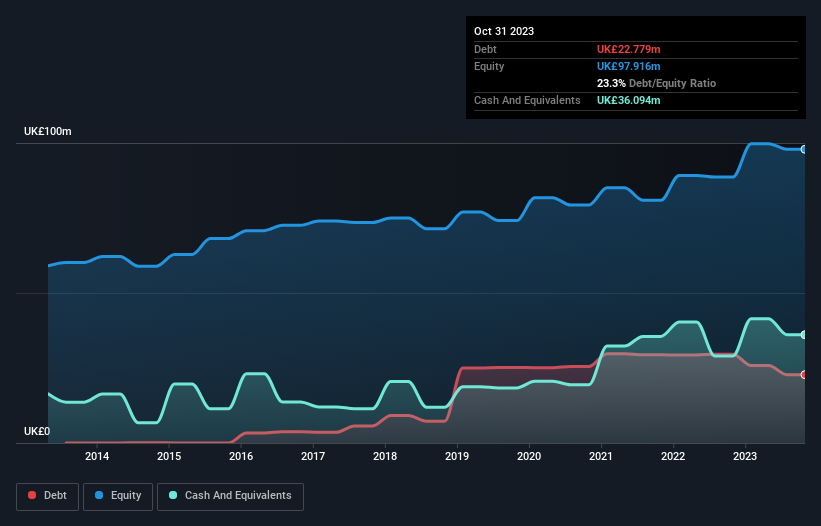
David Iben put it well when he said, 'Volatility is not a risk we care about. What we care about is avoiding the permanent loss of capital.' It's only natural to consider a company's balance sheet when you examine how risky it is, since debt is often involved when a business collapses. Importantly, Cohort plc (LON:CHRT) does carry debt. But the real question is whether this debt is making the company risky.
When Is Debt Dangerous?
Debt and other liabilities become risky for a business when it cannot easily fulfill those obligations, either with free cash flow or by raising capital at an attractive price. If things get really bad, the lenders can take control of the business. However, a more frequent (but still costly) occurrence is where a company must issue shares at bargain-basement prices, permanently diluting shareholders, just to shore up its balance sheet. Of course, the upside of debt is that it often represents cheap capital, especially when it replaces dilution in a company with the ability to reinvest at high rates of return. When we think about a company's use of debt, we first look at cash and debt together.
See our latest analysis for Cohort
What Is Cohort's Debt?
As you can see below, Cohort had UK£22.8m of debt at October 2023, down from UK£29.6m a year prior. However, its balance sheet shows it holds UK£36.1m in cash, so it actually has UK£13.3m net cash.

How Healthy Is Cohort's Balance Sheet?
According to the last reported balance sheet, Cohort had liabilities of UK£78.5m due within 12 months, and liabilities of UK£37.7m due beyond 12 months. Offsetting this, it had UK£36.1m in cash and UK£62.9m in receivables that were due within 12 months. So its liabilities total UK£17.3m more than the combination of its cash and short-term receivables.
Of course, Cohort has a market capitalization of UK£277.2m, so these liabilities are probably manageable. But there are sufficient liabilities that we would certainly recommend shareholders continue to monitor the balance sheet, going forward. Despite its noteworthy liabilities, Cohort boasts net cash, so it's fair to say it does not have a heavy debt load!
On top of that, Cohort grew its EBIT by 33% over the last twelve months, and that growth will make it easier to handle its debt. There's no doubt that we learn most about debt from the balance sheet. But ultimately the future profitability of the business will decide if Cohort can strengthen its balance sheet over time. So if you're focused on the future you can check out this free report showing analyst profit forecasts.
But our final consideration is also important, because a company cannot pay debt with paper profits; it needs cold hard cash. Cohort may have net cash on the balance sheet, but it is still interesting to look at how well the business converts its earnings before interest and tax (EBIT) to free cash flow, because that will influence both its need for, and its capacity to manage debt. Over the last three years, Cohort actually produced more free cash flow than EBIT. That sort of strong cash generation warms our hearts like a puppy in a bumblebee suit.
Summing Up
We could understand if investors are concerned about Cohort's liabilities, but we can be reassured by the fact it has has net cash of UK£13.3m. The cherry on top was that in converted 123% of that EBIT to free cash flow, bringing in UK£25m. So we don't think Cohort's use of debt is risky. Another factor that would give us confidence in Cohort would be if insiders have been buying shares: if you're conscious of that signal too, you can find out instantly by clicking this link.
If you're interested in investing in businesses that can grow profits without the burden of debt, then check out this free list of growing businesses that have net cash on the balance sheet.
New: AI Stock Screener & Alerts
Our new AI Stock Screener scans the market every day to uncover opportunities.
• Dividend Powerhouses (3%+ Yield)
• Undervalued Small Caps with Insider Buying
• High growth Tech and AI Companies
Or build your own from over 50 metrics.
Have feedback on this article? Concerned about the content? Get in touch with us directly. Alternatively, email editorial-team (at) simplywallst.com.
This article by Simply Wall St is general in nature. We provide commentary based on historical data and analyst forecasts only using an unbiased methodology and our articles are not intended to be financial advice. It does not constitute a recommendation to buy or sell any stock, and does not take account of your objectives, or your financial situation. We aim to bring you long-term focused analysis driven by fundamental data. Note that our analysis may not factor in the latest price-sensitive company announcements or qualitative material. Simply Wall St has no position in any stocks mentioned.
About AIM:CHRT
Cohort
Provides a various products and services in defense, security, and related markets in the United Kingdom, Germany, Portugal, Africa, North and South America, and the Asia Pacific and Africa, and other European countries.
Flawless balance sheet with solid track record.
Similar Companies
Market Insights
Community Narratives



